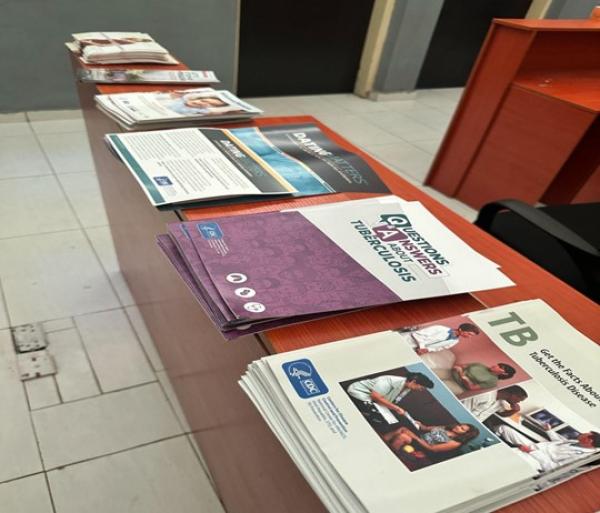Medical Outreach and Mobile Clinic in Southeast Nigeria
Published 01/29/2025 in Scholar Travel Stipend
Written
by Gladys Obaji |
01/29/2025

Nigeria is the most populated nation in Africa. It is divided into different sectors by region, language, and culture.
Healthcare Infrastructure in Southeast Nigeria
The Southeast Region is one of the six geopolitical zones comprising five states: Anambra, Abia, Ebonyi, Enugu, and Imo. Abia state is one of the major states and is known for its commercial hub, Aba. Within each state are villages, Abiriba is a united village and rural community located in Abia state known for its rich culture and traditions. It is also where this medical outreach and mobile clinic was held.
Healthcare infrastructure remains a struggling sector in southeast Nigeria. The issues range from limited access, inadequate facilities, poor compensation, and health inequalities to a lack of medical professionals. There is a rampant “brain drain” of medical professionals in the country as they seek greener pastures in other more developed countries where they are compensated well for their labor and length of training.
Women’s Health: Menstrual Hygiene & Maternal Health
Menstrual health remains a taboo in many settings especially rural communities where the rates of health illiteracy are high. Thus, leaving much room for misconception. Girls and women in rural communities often use rags as menstrual pads, wash and then reuse them, because sanitary pads can be expensive and inaccessible. Some girls will frequently miss school days to stay at home during their menses. This unsanitary form of management breeds infection and strips women of their privacy and dignity.
Fortunately, the WASH Foundation (an evolution of Clean the World Foundation), in conjunction with UNICEF Nigeria, has worked to establish programs in Nigerian schools to train girls to use sewing machines and affordable fabric to make hygienic sanitary materials. They were also trained on how to use and safely re-use the pads. The initiative has been ongoing in Southwest Nigeria but is lacking in the Southeast region.
Our Intervention
Health literacy is important because it plays a major role in ensuring that individuals can understand, navigate, and make informed decisions about their health and that of their families. A survey of rural women in southern Nigeria found that most women had poor health literacy. There was one study, that quantified the percentage to 71.25%. However, this study focused on intra-city drivers who are predominantly male. In conjunction with the Abiriba Communal Improvement Union (ACIU), the youth came together to donate menstrual supplies to the women and girls in Abiriba and neighboring villages. The supplies consisted of reusable and non-reusable menstrual pads and menstrual cups. Villagers were provided with informational resources on menstrual hygiene, and infectious diseases that are most rampant in the region i.e. tuberculosis, hepatitis, and malaria. As a third-year physician resident and budding consultant, I aided mainly in counseling attendees on heart health, pain management, and other burning questions that they had. I was assisted by one family medicine resident and a cardiology attending who were all eager to see the people’s health literacy improve. We were accompanied by a translator who made the conversations even more seamless.

There was also a mini-clinic station for blood sugar and blood pressure screening. Many of the patients are of Black/African descent which alone can be a predisposition to cardiovascular and metabolic diseases. One of the villages’ major hospitals, Akahaba General Hospital (location of the medical clinic and outreach), is being fully funded by the ACIU and therefore purely donation driven. Fortunately, this removes the financial barrier around health access for the local villagers, but the lack of facilities/hospitals and low health literacy rates remain.
Observation/Conclusion
The mobile clinic and medical outreach came during the festive season when many community members were attending numerous amounts of events, eating all sorts of foods, and sometimes forgetting to take their medications. As a result, we were met with several villagers with high blood pressure and elevated blood sugar levels. The most common chief complaint that I received as a consultant of the day was pain and arthritic symptoms. Questions included: What causes arthritis? How can I ensure that I have a safe and healthy pregnancy? What is sickle cell anemia?
Not only could patients ask about themselves, but they were also able to ask about other lingering questions. This also helped to improve their health literacy in conjunction with the pamphlets provided on other health topics. In the future, we would also hope to have the pamphlets translated into both English and Igbo.
In terms of menstrual hygiene and contraception, I found that discussing these topics made several women uncomfortable. Whenever possible, I would try to bring up the topic of contraception and the different options, especially in women who were taking the pill inconsistently. I think that it is important that they are still educated, no matter how uncomfortable it is. I believe that the more that conversations are enforced repeatedly, the more comfortable they will be as repetition is key. It is also important that these discussions are had throughout the year and not only during the festive seasons.
Overall, the medical outreach was a success. The children, men, and women had a wonderful time learning about their health, asking pertinent questions, and interacting with other children with fun games and prizes, and in return, the villagers will be able to pass down the gift of health literacy to the next generation. Although intangible, knowledge is a precious gift that can change the course of a family and generation and I believe that this is one pertinent way of doing it. As Nelson Mandela would say, “Education is the most powerful weapon which you can use to change the world.” A special thanks to ACIU for making this opportunity to serve worthwhile.
References
- https://en.wikipedia.org/wiki/South_East_(Nigeria)
- https://www.unicef.org/nigeria/stories/no-more-limits-girls-learn-how-make-their-own-sanitary-pads
- https://www.unicef.org/nigeria/stories/zainab-menstrual-hygiene-management-good-business
- https://literacy.mums.ac.ir/article_19356_158da95980f2ed5ed3b37c94374c9e4b.pdf
- https://pubmed.ncbi.nlm.nih.gov/27295830/

